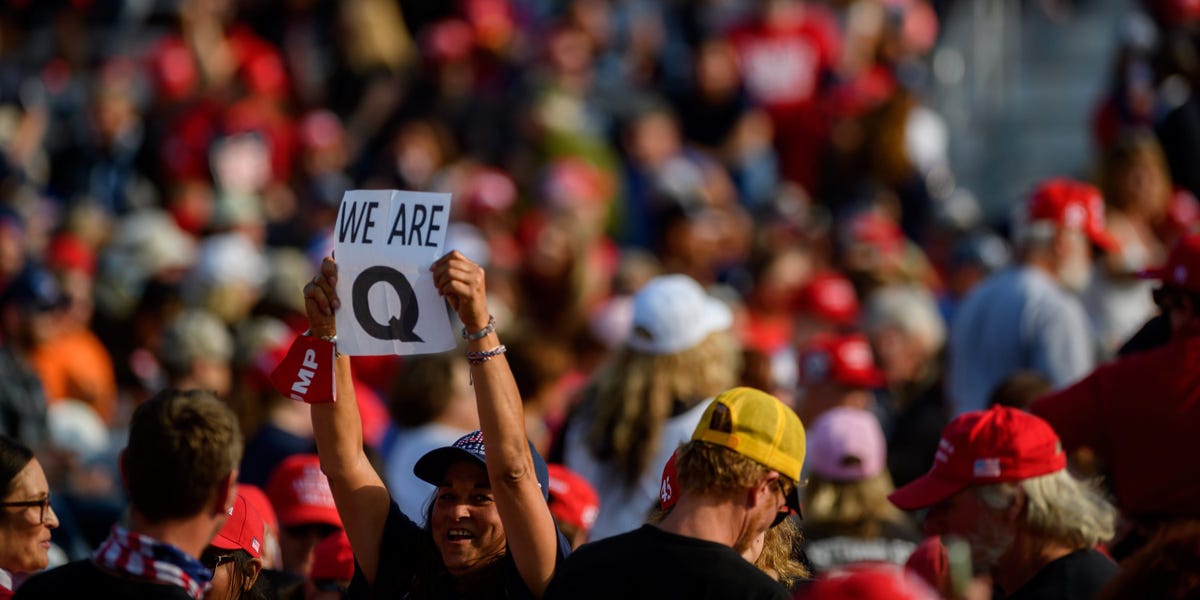YouTube’s CEO won’t commit to banning QAnon content from platform

- YouTube CEO Susan Wojcicki isn’t committing to an outright ban of QAnon content on the platform.
- Wojcicki was asked about banning QAnon, a baseless far-right conspiracy theory, during an interview with CNN’s Poppy Harlow. She cited the movement’s grassroots nature as a complicating factor in banning it but added that YouTube’s policies are continuing to evolve.
- Wojcicki said YouTube has already removed “hundreds of thousands” of QAnon videos and made changes to its recommendations tool, which she said have resulted in an 80% reduction in views on QAnon videos.
- Earlier this month, Facebook dealt a blow to the QAnon movement by announcing it would ban Pages and Groups, as well as Instagram accounts, that represented QAnon.
- Visit Business Insider’s homepage for more stories.
Facebook may have banned QAnon content from all of its platforms, but Susan Wojcicki isn’t committing to doing the same on YouTube.
The YouTube CEO on Monday told CNN’s Poppy Harlow that the company is looking “very closely” at videos relating to the conspiracy-theory movement QAnon, but wouldn’t say whether YouTube has plans to institute an outright ban, citing the movement’s leaderless nature as a factor.
“I think if you look at QAnon, part of it is that it’s a grassroots movement, and so you could see just lots and lots of different people who are uploading content that has different QAnon theories,” Wojcicki said. “We’re very proactive in terms of removing it, and I think you’ll see us continue to be so.”
Wojcicki said YouTube has implemented multiple policies to curb the spread of QAnon content, including making changes to its recommendations tool, which she said have resulted in an 80% reduction in views on QAnon videos. In addition, YouTube has already removed “hundreds of thousands” of QAnon videos for violating other parts of the platform’s policies, like those prohibiting COVID-19 misinformation or hate and harassment, Wojcicki said.
“I would say we already implemented a large number of different policies that have helped to maintain that in a responsible way,” Wojcicki said, adding that YouTube’s policies are continuing to evolve. “It’s not that we’re not looking at it,” she said.
QAnon is a baseless far-right conspiracy theory that claims President Donald Trump is secretly fighting a “deep state” cabal of satanic pedophiles and cannibals. The FBI has labeled QAnon a domestic-terrorism threat.
QAnon emerged on online message boards like 4Chan in 2017 before moving to mainstream social media sites like Facebook and YouTube, as Business Insider’s Tom Porter pointed out. YouTube has since become rife with videos promoting the conspiracy theory. Last month, a study from Pew Research Center found that QAnon is the most commonly mentioned conspiracy theory among the most-viewed independent news channels on the platform.
When Facebook announced its QAnon ban earlier this month, it said that it wouldn’t remove individual posts pertaining to the conspiracy theory, only Facebook Pages and Groups, and Instagram accounts representing QAnon. Wojcicki told CNN that YouTube is “very different” from Facebook and would need to first define a clear policy around what QAnon is.
“I think the way to approach it is by actually having the policies implemented in the right way,” she said. “And our platform is very different from how Facebook works. And so I think each of us will take an approach that makes the most sense for our platforms.”
*** This article has been archived for your research. The original version from Business Insider can be found here ***


